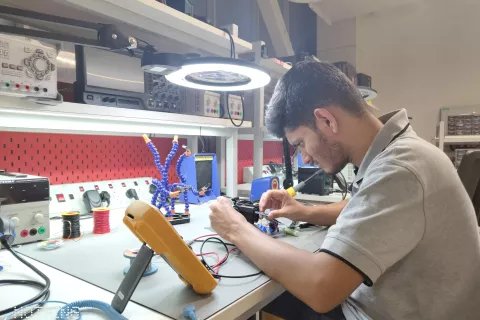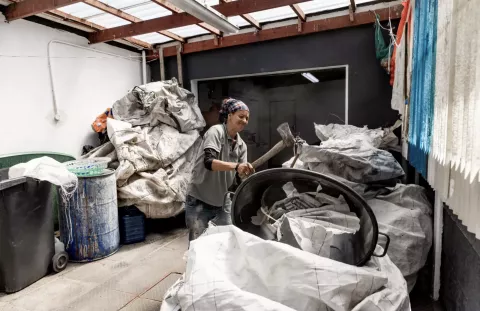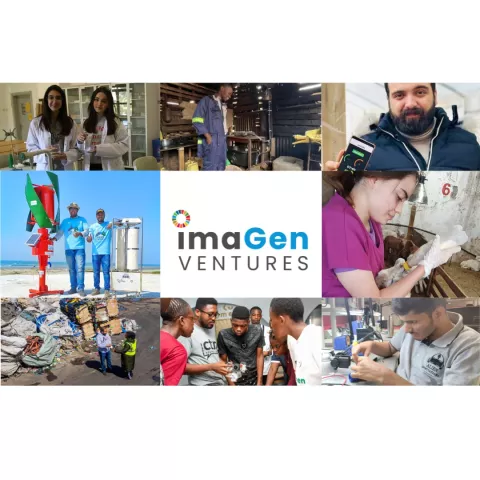More than half of South Asian youth are not on track to have the education and skills necessary for employment in 2030
South Asia has the largest youth labour force in the world with nearly 100,000 young people entering the labour market each day

KATHMANDU/NEW YORK/MUMBAI, 29 October 2019 – An estimated 54 per cent of South Asian youth leave school without the necessary skills to get a decent job in the next decade, according to data produced by the Global Business Coalition for Education (GBC-Education), the Education Commission, and UNICEF.
According to the data, South Asia lags behind several other regions in preparing the next generation of young people with the skills they will need for 21st century work. Projections place South Asia well below the global average. This builds on the estimates UNICEF produced with the Commission last year on the projected learning outcomes in 2030 for all South Asian countries.
Special edition of GBC-Education’s 2030 Skills Scorecard: School age children on track to complete secondary AND reach the learning benchmarks, per cent*:
| Country | Today | 2030 Projection |
| Bangladesh | 26% | 55% |
| Bhutan | 47% | 81% |
| India | 19% | 47% |
| Maldives | 16% | 46% |
| Nepal | 18% | 40% |
| Pakistan | 18% | 40% |
| Sri Lanka | 61% | 68% |
"Every day, nearly 100,000 young South Asians – a large sports stadium of young people – enter the labour market, almost half of them not on track to find 21st century jobs,” said Henrietta Fore, UNICEF Executive Director. “South Asia is at a critical juncture, with a limited window during which it can reap significant demographic dividends from its talented and capable youth. Get it right, and millions could be lifted out of poverty. Fail to do so, and economic growth will falter, youth despair will rise, and further talent will be lost to other regions.”
With almost half of its population of 1.8 billion below the age of 24, led by India, Pakistan and Bangladesh, South Asia will have the largest youth labour force in the world until 2040. This offers the region the potential to drive vibrant and productive economies. If strong investments in skills development are made, the region is poised to maintain strong economic growth as well as an expansion of opportunities in the education and skills sectors in the coming decades.
However, a recent UNICEF ‘Voices of Youth’ survey conducted among 32,000 young people in South Asia reveals concerns among these under 24-year-olds about how well they are being prepared for the modern economy. According to the poll, many young people in South Asia feel their education systems are outdated and do not prepare them for employment. They cite lack of work experience (26%), inadequate support services to improve employability (23% received no support and most received limited and not comprehensive support), and bribery demands/discriminatory and unfair hiring practices (44%) as key barriers to finding employment even after they have graduated.
“This is a crisis,” said Justin Van Fleet, Executive Director of the Global Business Coalition for Education. “Addressing the youth skills gap in South Asia requires government investments, commitments from the business community, contributions from civil society, and the perspective of young people to best equip the next generation to successfully enter the rapidly changing job market.”
A separate new report commissioned by UNICEF identified major obstacles to addressing the youth skills gap in the region. These include the low quality of education and suboptimal vocational training which do not give students the desired skill levels the labour market demands, among others. Compiled by Ernst & Young India, this report identifies a total of 30 already-in-operation solutions to the youth skills crisis.
UNICEF, the Global Business Coalition for Education, and Generation Unlimited are convening a major forum from October 29-31 in Mumbai to bring together leaders from government, youth and the business community to address the education and skills crisis and showcase solutions. Representatives from Accenture, Britannica, Grameenphone, Tata STRIVE, Google, Maruti Suzuki, ILO, Capgemini Technology Services, Ooredoo, Jetwing, etc. will also attend.
“In my travels, I have heard the voices of young people — their ideas, their enthusiasm, their vision for the future. I have also heard their worries about not getting the education or skills they need, and not being able to find a job,” Fore said. “The world of work is changing fast. If governments invest in better and modern education, and businesses create better opportunities for young people to enter the job market, South Asia can set an example for the world. But this can only be done if we act smart, and act together.”
###
* These estimates were generated based on a 2019 update of the Education Commission’s original 2016 projections model for the Learning Generation report. Most recent national learning assessment data used for each country as follows: BCSE 2015 for Bhutan, GCE O Levels 2016 for Sri Lanka, LASI 2015 for Bangladesh, NAT 2016 for Pakistan, NCERT 2017 for India, Nepali country assessment 2017 for Nepal, O Level Exam 2016 for Maldives. Afghanistan is not included due to lack of recent learning assessment data at the secondary level.
Notes to editors:
About the South Asia Youth Skills and Solutions Forum: The South Asia Youth Skills and Solutions Forum will build upon the Generation Unlimited initiative and GBC–Education’s Youth Skills and Innovation initiative, and aims to advance the development of partnerships between the private sector, governments and international agencies to scale-up sustainable solutions to the youth skills crisis in the region. It will engage young people from across South Asia in meaningful interaction, action-focused meetings and sessions linking education, employability, and skills.
About Developing Skills in Youth to Succeed in the Evolving South Asian Economy: Developing Skills in Youth to Succeed in the Evolving South Asian Economy (Ernst & Young India) cited additional barriers, including a lack of or limited support for self-employment and entrepreneurship, especially for youth who have problems obtaining loans, registering businesses or obtaining soft skills that can help them succeed. The education and skills training systems and the labour market are particularly biased against young women due to factors like marriage expectations, safety concerns and gender stereotypes. Youth with disabilities are one of the most marginalised and excluded groups in South Asia when it comes to obtaining education and employment. A lack of motivation and participation by local youth in certain sectors and job categories lead to increased demand for migrant workers. Construction and manual labour jobs are instances where a change in perception of the value of these jobs is needed as much or more than skilling initiatives.
The solutions identified in the report by EY India reveal new efforts to address longstanding issues, like rural access to training, matching skills training with labour market needs, and matching soft skills development (e.g. communication, team management) with technical skills growth. These solutions each require committed partnerships between public and private actors and youth themselves, and indicate where investments can boost economic growth, increase employer profitability, lower unemployment, and drive high returns to the labour and skills of young workers.
About the Global Business Coalition for Education: The Global Business Coalition for Education (GBC-Education) is a movement of businesses committed to ending the global education crisis and unleashing the potential of the next generation. The organization's mission is to ensure that every child has the best start in life, a safe place to learn, and skills for the future. Established in 2012 by the global children’s charity Theirworld, GBC-Education is committed to bringing together the expertise and resources of the business community to help achieve Sustainable Development Goal 4 – quality, inclusive education for all. Serving as the business community’s social impact advisor, the organization helps businesses develop customized programmes and identify investments, partnerships, and opportunities that will have the greatest impact.
About UNICEF: UNICEF promotes the rights and wellbeing of every child, in everything we do. Together with our partners, we work in 190 countries and territories to translate that commitment into practical action, focusing special effort on reaching the most vulnerable and excluded children, to the benefit of all children, everywhere. For more information about UNICEF and its work for children, visit www.unicef.org. Follow UNICEF on Twitter and Facebook
About Generation Unlimited: Generation Unlimited is global partnership working to prepare young people to become productive and engaged citizens. It connects secondary-age education and training to employment and entrepreneurship, empowering every young person to thrive in the world of work. Visit: www.generationunlimited.org. Follow Generation Unlimited on Twitter and Instagram




